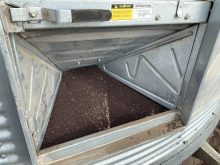First it was canola and now it’s soybeans.

China, Canada’s biggest soybean customer, has all but stopped buying Canadian soybeans, Ron Davidson, executive director of Soy Canada said in an interview May 6.
“Traders have been saying China just has no interest in buying (from Canada),” Davidson said.
“What I got from the traders is the Chinese aren’t interested because they are worried about having problems getting them in.”
The drop in exports could be related in part to China’s displeasure with Canada’s arrest late last year of Meng Wanzhou, vice-president of Chinese technology firm Huawei, at the request of U.S. government, he said. But China’s demand for Canadian soybeans dropped starting in January — two months before China complained Canadian canola imports were contaminated resulting in it boycotting Canadian canola purchases in late March.
Read Also

Gene editing up a better canola crop: FEATURE
Gene editing techniques and maize genetic material may be the seed for more robust and stress tolerant canola plants. Canadian research is trying to make it happen.
In the last four months of 2018 China imported a total of 3.2 million tonnes of Canadian soybeans worth $1.6 billion, Davidson said quoting Statistics Canada data. That’s an average of almost 800,000 tonnes a month.
In January and February Canadian soybean exports to China totalled just 2,398 tonnes, or an average of 1,199 tonnes — a drop of 99.9 per cent.
“The March numbers will be out soon, but I’ve talked to the traders and I think it will be virtually nothing again,” Davidson said. “I can’t say they’ve stopped, but this is the same thing as stopped.
“If they didn’t buy much for a month or two, maybe you could explain that because Brazil came on. The problem is all the messaging coming back to traders now is we’re out of the market. We’re worried about going forward.”
Losing the Chinese market is the second blow in as many years to Canada’s soybean industry, Davidson said. When China imposed a 25 per cent tariff on imported American soybeans last year in retaliation to United States’ President Donald Trump’s tariffs on Chinese imports, it drove Canadian soybean prices down 25 per cent, Davidson said. It also forced the Americans to export more soybeans to other markets, pushing Canada out.
“We export to 70 countries and in every one of them, including Canada, they (U.S.) were ever present with a low price and strong presence because they have a record carry-over,” he said.
Typically Canada has exported a third of its soybeans to China, but because the U.S. was more aggressive in other markets, Canada ended up shipping more than 60 per cent of its soybeans to China last year.
“That has made us so dependent on that (China) market now we’ve got a problem if we’re not selling there anymore,” Davidson said. “We would normally have a more diversified market but because of the trade war last year we lost our trade diversification.”
Canadian soybean producers saw a big drop in prices because of U.S. trade policy, which President Trump offset with a US$1.65-a-bushel subsidy to American producers, Davidson said.
“We have been requesting some kind of consideration (from the Canadian government) because essentially (American) producers are indemnified,” he said. “We’re not having much response on that, but we’re not giving up on that by the way.”
This year Canadian soybean growers are not only facing lower prices due to U.S. policy, but also the loss of their biggest market.
While African swine fever is decimating Chinese hog production, resulting in less demand for soybean imports, Davidson said China is still importing soybeans from other countries, including the U.S.
Last week the federal government raised the cash advance loan limit to $1 million. The interest-free portion for canola loans was increased to $500,000. While that will help farmers with cash flow it doesn’t increase canola or soybean prices or open new markets, Davidson said.
Farm groups say because of program flaws, AgriStability won’t help either, Davidson said.
“We’re not seeing a light at the end of the tunnel,” he said. “It’s not like we can suddenly go out and start selling more soybeans in other markets… because of the Americans dumping their product out there. Now there’s going to be added pressure from canola everywhere else (as the federal government leads trade missions to find canola markets to offset the loss of exports to China).”




















